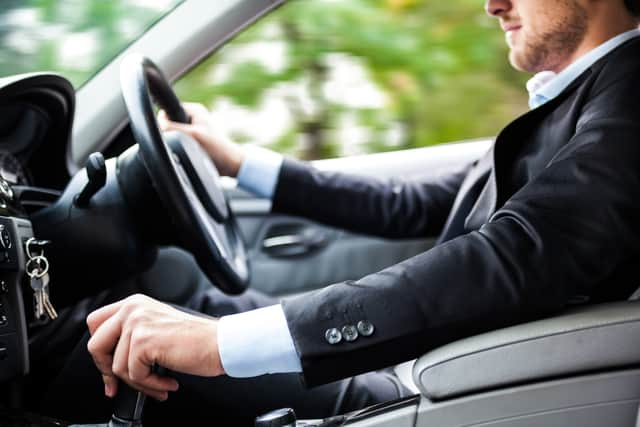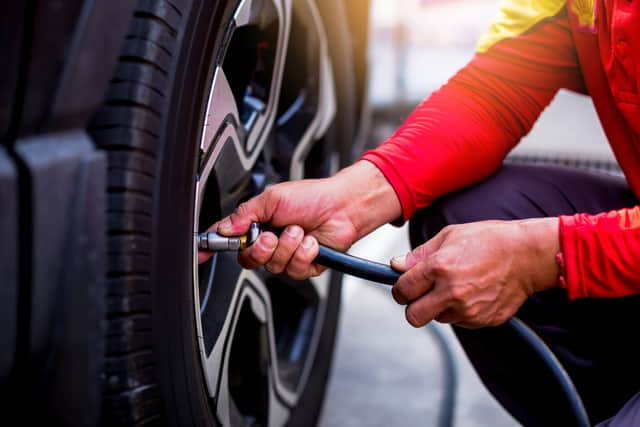Money saving tips for drivers: how to save on fuel, insurance and other bills during cost of living crisis
and live on Freeview channel 276
The cost of running a car remains painfully high in 2023 as drivers struggle with high fuel prices, rising repair bills and the prospect of higher car tax and fuel duty.
Petrol and diesel prices have recently weakened but are still far above historical averages and with the cost of food and energy also at record levels, many drivers are struggling to stay mobile. A recent survey found that more than a third of drivers (35%) faced difficulty keeping their car running and 40% feared that would have to give up driving if costs continue to rise.
Advertisement
Hide AdAdvertisement
Hide AdUsing a car less, or getting rid of it entirely, are the quickest ways to cut running costs but for many motorists that simply isn’t an option, so we’ve come up with some other steps you can take to cut the cost of motoring, from saving fuel to being smart about where you park.
Drive efficiently


Fuel is one of the single biggest expenses for drivers and even with recent drops in prices, petrol and diesel are still far more expensive than they were a year ago. Adapting your driving style and making small changes to how you use your car can shave pounds from your fuel bill.
- Driving smoothly and steadily is key to maximising your car’s fuel efficiency. Avoid harsh acceleration and braking as these burn more fuel, and try to anticipate what the traffic around you is going to do to help maintain a steady speed.
- Keep your speed down. The AA estimates that driving at 70mph uses up to 9% more than at 60mph while sitting at 80mph can use up to 25% more fuel than at 70mph.
- Stick to standard fuel. Unless you drive a performance car, you’re unlikely to notice the supposed benefits of premium fuels so save yourself around 10p per litre and stick with regular unleaded or diesel.
- If you do most of your driving in town, switch off your air conditioning and open a window. At low speeds this is the more effective way to cool your car. At high speeds, however, the air drag is worse for efficiency, so shut the windows and turn on the air con.
- Ditch unnecessary weight and drag, such as bike racks and roof bars, and clear out any clutter that’s weighing your car down.
Most of these tips are just as valid for electric cars as they are for petrol and diesel and just as important as the cost of charging an EV climbs.
Shop around for fuel
Fuel prices are high at the moment but even within a small area prices can still vary by several pence per litre. Check filling station costs as you travel or use an online tool such as Petolprices.com to check prices near you. And don’t assume supermarkets are the cheapest. Recent research found that independent filling stations have led the way on recent price cuts.
Advertisement
Hide AdAdvertisement
Hide AdThe same goes for charging an EV. Different public providers charge different rates and you can also save money by opting for a slower charger if you’re not in a hurry. If you charge at home, try to find a time of use or EV-specific tariff, which could cut charging costs to as little as 7p per kWh.
Check your tyres
While there are lots of driving techniques to save fuel, one of the easiest ways is to make sure your tyres are at the right pressure. Over or underinflated tyres can affected economy by up to 3%, so check them regularly. Different tyres can also offer different economy performance, so when it’s time to replace them compare the eco rating and see if a different rubber could save you money.


Cut insurance costs
Car insurance, along with fuel, is among the biggest costs for drivers but there are several ways to save money.
- Shop around and don’t just accept your renewal quote. Even with recent changes to the law, there’s no guarantee your current provider can provide the cheapest cover, so compare quotes before renewing.
- Make sure your cover meets your use and needs. There’s no point in paying for commuting cover if you don’t drive to work, or paying for more miles than you actually drive each year. Also check what extras are included in your policy and consider whether you need them all. And consider your named drivers. Adding an older, more experienced driver can actually reduce premiums but younger drivers are likely to push up costs.
- Consider a black box policy. These telemetry-based policies use a tracker to monitor driver behaviour. While it sounds a bit Big Brother, they can help cut costs, especially for young drivers. Just read the small print so you know exactly what restrictions you might face before signing up.
- Most insurers charge more to pay in monthly instalments so, if you can afford to, pay your premium in a single lump sum.
Pay tax annually
Like insurance, it’s cheaper to pay your car tax in a single lump than in instalments. The DVLA charges a 5% premium for paying by monthly direct debit and paying in six-monthly chunks is also more expensive, so if you’ve got the funds, pay for 12 months tax at a time.
Carry out your own pre-MOT checks
Advertisement
Hide AdAdvertisement
Hide AdThe annual MOT checks your car’s roadworthiness and can pick up problems you’re unaware of. However, many of the most common MOT failures are issues that can be spotted and fixed at home far more cheaply than relying on your mechanic.
Before presenting your car for its test check all the lights, washer fluid level, the condition of the wiper blades and the tread depth on the tyres. Buying new bulbs, blades and fluids from a motor factor and fitting them yourself will be cheaper than paying your garage to do it. Being able to shop around for new tyres in advance also means you’re more likely to find a better deal.
Buy used
A car is among the most expensive things many people will buy in their life and that’s especially true of brand new models. Although used car prices have been climbing, you can still save thousands of pounds by opting for a secondhand model.
If you want something nearly new dealers often sell off ex-demonstrator models with low mileages after just a few months with significant reductions on the brand-new price. If that’s still too expensive, the secondhand market has options for virtually any budget - just follow our advice before handing over any money for a used car.
Park smart
Advertisement
Hide AdAdvertisement
Hide AdAs with fuel and insurance, it pays to shop around for the cheapest parking. Online tools and apps like Parkopedia can help compare prices at different car parks near your destination, making it easy to save money. Alternatively, use a park and ride service or sign up for one of the online driveway sharing services such as YourParkingSpace or JustPark where homeowners rent out parking spaces, often for far less than official car parks. This works both ways and you could make money by renting out your own driveway while you’re at work.
Comment Guidelines
National World encourages reader discussion on our stories. User feedback, insights and back-and-forth exchanges add a rich layer of context to reporting. Please review our Community Guidelines before commenting.
